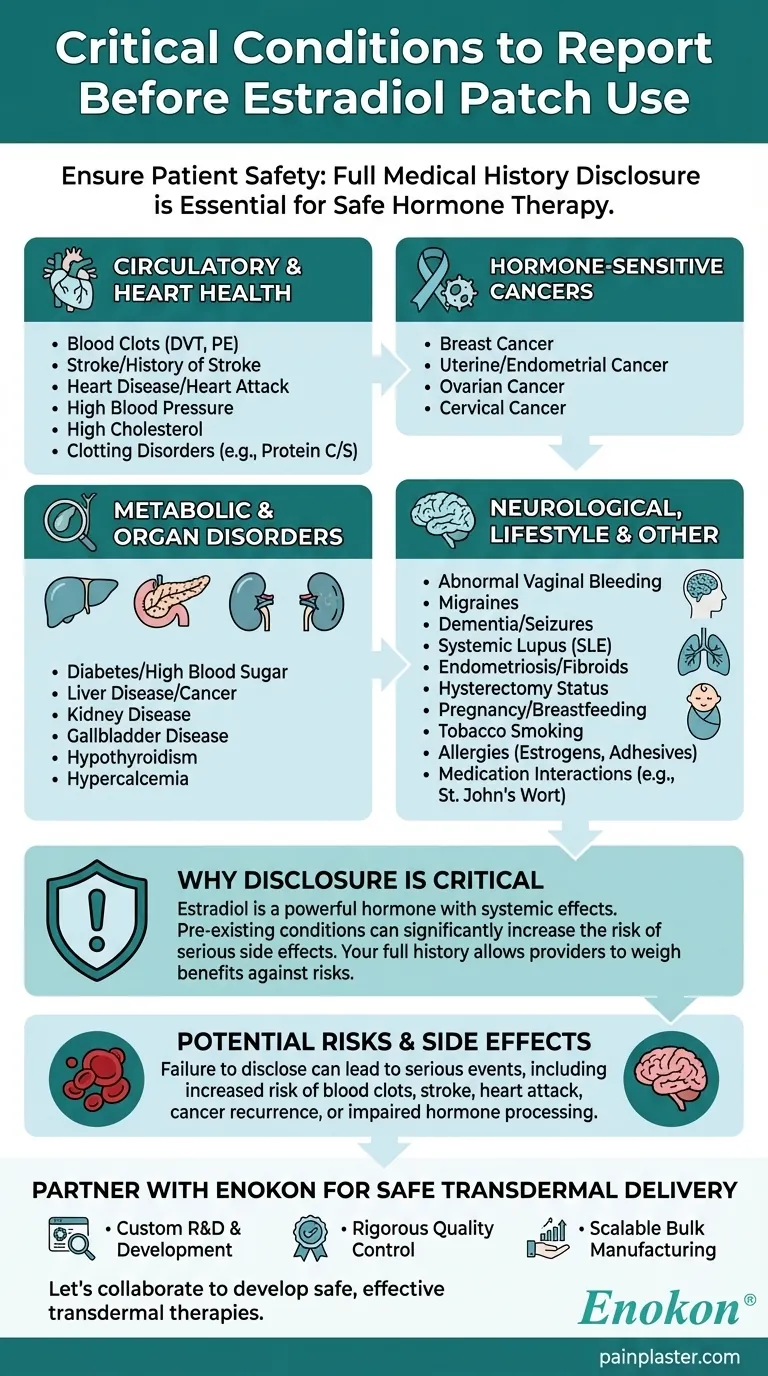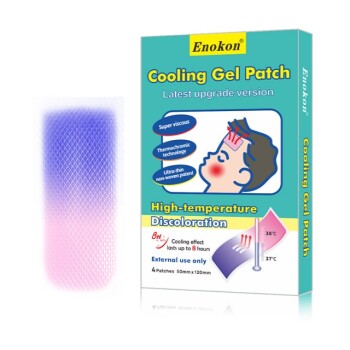Before using an estradiol patch, it is essential to inform your healthcare provider about a wide range of medical conditions. The most critical disclosures involve any history of abnormal vaginal bleeding, blood clots, stroke, heart disease, or hormone-sensitive cancers such as breast or uterine cancer. You must also discuss any liver disease, high blood pressure, diabetes, or if you are pregnant or breastfeeding.
The core principle is that estradiol is a powerful hormone that affects multiple body systems. Full disclosure of your health history allows your provider to accurately weigh the therapeutic benefits against the potential risks, ensuring the treatment is safe and appropriate for you.

Why Full Disclosure is Critical for Your Safety
Estradiol is a form of estrogen, a primary female hormone. When you use an estradiol patch, this hormone is absorbed through your skin and enters your bloodstream, impacting everything from your bones and blood vessels to your reproductive organs.
Because of its systemic effects, pre-existing health conditions can significantly increase the risk of serious side effects. Your complete medical history provides the necessary context for your provider to make a safe prescribing decision.
Key Conditions to Discuss with Your Provider
Organizing your health history into categories can help ensure you cover all essential information during your medical consultation.
Circulatory and Heart Health
This is one of the most critical areas of concern for estrogen therapy. Be sure to report any history of:
- Blood clots (e.g., deep vein thrombosis or pulmonary embolism)
- Stroke or a history of stroke
- Heart disease or a recent heart attack
- High blood pressure (hypertension)
- High cholesterol or triglycerides
- Protein C or Protein S deficiency, which are blood clotting disorders
Hormone-Sensitive Cancers
Estrogen can promote the growth of certain cancers. It is vital to disclose if you have or have ever had:
- Breast cancer
- Uterine or endometrial cancer
- Ovarian cancer
- Cervical cancer
Metabolic and Endocrine Disorders
Hormones and metabolism are deeply interconnected. Inform your provider about:
- Diabetes or high blood sugar
- Gallbladder disease
- Liver disease or liver cancer
- Kidney disease
- Low thyroid levels (hypothyroidism)
- High calcium levels in the blood (hypercalcemia)
Neurological and Other Medical History
Various other conditions can be affected by hormonal changes. Mention if you have:
- Abnormal vaginal bleeding that has not been diagnosed
- Migraine headaches
- Dementia
- Seizures
- Systemic lupus erythematosus (SLE)
- Endometriosis or uterine fibroids
- Status of a hysterectomy, as this changes the risk profile
Personal Circumstances and Allergies
Beyond diagnosed diseases, your provider needs to know about your current life stage, habits, and any known sensitivities.
Pregnancy and Breastfeeding
Using estradiol is contraindicated if you are pregnant, trying to become pregnant, or breastfeeding.
Allergies
Disclose any known allergic reactions to estrogens, progestins, or any other medications. You should also mention sensitivities to patch adhesives or other components, such as menthol or salicylates.
Lifestyle and Other Medications
Inform your provider if you are a tobacco smoker, as smoking significantly increases the risk of blood clots while on estrogen. Provide a full list of all medications you take, including over-the-counter supplements like St. John's wort, which can interfere with estradiol's effectiveness.
Understanding the Risks and Potential Side Effects
Failing to disclose these conditions can lead to serious health events. Estrogen therapy can increase the risk of blood clots, which may lead to a stroke or heart attack, especially in individuals with pre-existing circulatory issues.
For those with a history of hormone-sensitive cancers, using estradiol could potentially trigger a recurrence. Furthermore, conditions like liver or kidney disease can impair your body's ability to process the hormone, leading to unsafe levels and increased side effects.
Be vigilant for signs of trouble, such as sudden leg pain or swelling, chest pain, shortness of breath, or yellowing of the skin or eyes (jaundice), and contact your provider immediately if they occur.
Making the Right Choice for Your Health
Your health history is the primary factor in determining if an estradiol patch is a safe option for you.
- If your primary focus is safety with a history of blood clots, stroke, or heart disease: Estradiol therapy is often considered too risky and may be contraindicated.
- If your primary focus is safety with a history of breast or uterine cancer: Estradiol patches are typically not recommended due to the risk of cancer recurrence.
- If your primary focus is managing a condition like diabetes, liver, or kidney disease: Your provider may still prescribe the patch but will require more frequent monitoring to ensure your safety.
- If you are pregnant, planning to be, or breastfeeding: You should not use estradiol patches.
Proactive and honest communication with your healthcare provider is the single most important step toward safe and effective treatment.
Summary Table:
| Category | Key Conditions to Report |
|---|---|
| Circulatory & Heart | Blood clots, stroke, heart disease, high blood pressure |
| Cancer History | Breast, uterine, ovarian, or cervical cancer |
| Metabolic & Organ | Liver disease, kidney disease, diabetes, gallbladder disease |
| Other Critical Info | Abnormal vaginal bleeding, pregnancy, smoking, medication allergies |
Ensure Patient Safety with Reliable Transdermal Delivery
As a healthcare distributor or brand, providing safe and effective hormone therapy is paramount. At Enokon, we are a bulk manufacturer of reliable, high-quality estradiol patches and other transdermal solutions.
Partner with us to benefit from:
- Custom R&D and Development: Our technical expertise allows us to tailor transdermal patch formulations to meet specific safety profiles and delivery requirements.
- Rigorous Quality Control: We ensure every patch delivers consistent, accurate dosing for optimal patient outcomes.
- Scalable Manufacturing: We support your needs with reliable bulk production for global distribution.
Let's collaborate to develop safe, effective transdermal therapies for your patients.
Contact our experts today to discuss your custom patch needs.
Visual Guide

Related Products
- Far Infrared Deep Heat Relief Patches Medicated Pain Relief Patches
- Menthol Gel Pain Relief Patch
- Icy Hot Menthol Medicine Pain Relief Patch
- Capsaicin Chili Medicated Pain Relief Patches
- Mugwort Wormwood Pain Relief Patch for Neck Pain
People Also Ask
- How quickly does the Deep Heat Pain Relief Back Patch activate and how long does it provide warmth? Get 16-Hour Relief
- How effective are pain relief patches for muscle pain? Target Localized Pain with Transdermal Delivery
- How often should pain relief patches be used? Get the Right Schedule for Targeted Relief
- How do pain relief patches provide targeted relief? Discover the Science Behind Effective Pain Management
- What are pain relief patches and how are they used? A Guide to Safe, Targeted Relief













